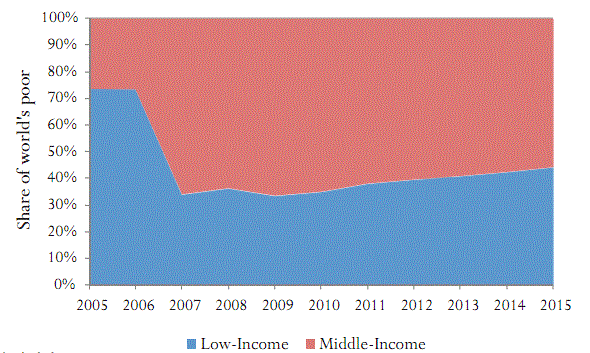Over at Brookings, Laurence Chandy and Geoffrey Gertz have just published an interesting new paper (pdf) on the state of global poverty. Among its generally upbeat findings:
Between 2005 and 2010, the total number of poor people around the world fell by nearly half a billion people, from over 1.3 billion in 2005 to under 900 million in 2010.
Poverty reduction of this magnitude is unparalleled in history: never before have so many people been lifted out of poverty over such a brief period of time. Furthermore, the first Millennium Development Goal target – to halve the rate of global poverty by 2015 from its 1990 level – has already been met, approximately three years ago. And based on our projections, by 2015, we will not only have halved the global poverty rate, but will have halved it again.
The authors also find that from 2005 to 2015, “Asia’s share of global poverty is expected to fall from two-thirds to one-third, while Africa’s share more than doubles from 28 to 60 percent” (though they also note that Sub-Saharan Africa’s poverty rate has now fallen below 50 percent for the first time, and should fall below 40 percent by 2015—something China didn’t manage until the mid-90s).
The immediate thought that occurred to me was: if poverty becomes increasingly concentrated in Africa, does that contradict Andy Sumner’s findings about poverty being increasingly concentrated in middle income countries? Answer: no. In fact, the authors say explicitly that their analysis verifies Andy’s findings. But they also add that 2009 marked a low point for concentration of poverty in low income countries (with 33.4% of poor people living in them) – and foresee a gradual rise back up to 44.9% of poor people living in LICs by 2015 (see graph below).
(Wondering what the hell happened in 2007? India graduated to Middle Income Country status.)




